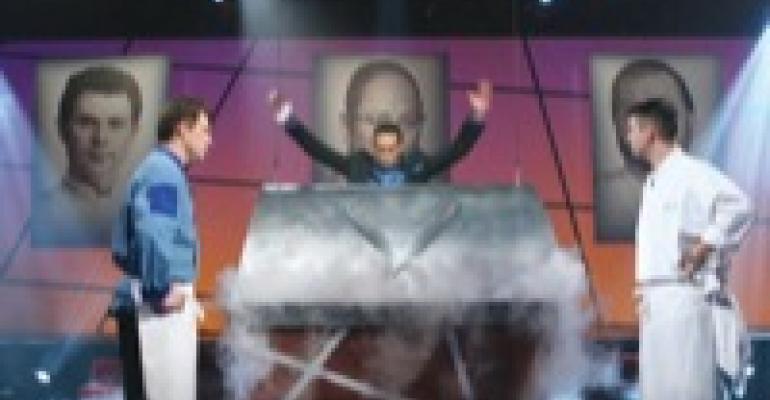—Michael Ruhlman
 |
| Grand Opening: Iron Chef America's "mystery ingredient" is chosen from a very short list. |
 |
| The Verdict Is In: New RH columnist Michael Ruhlman (r.) shared judging duties with Ming Tsai (l.) and Todd English on the PBS series Cooking Under Fire. |
The problem with reality chef competition shows isn't with the format. It's not with the chef-host, either Ranting
Ramsay on Hell's Kitchen or Congenial Colicchio on Top Chef. And it's not that what these shows present does not reflect the industry or the work of professional cooking (it doesn't, really, but how could it?).
The problem with these shows is they don't attract anyone who can actually cook. Rather, they don't attract chefs who can really cook.
Sure all the folks chosen to compete seem like they'd acquit themselves fine on the line at a Morton's steakhouse. And that's no put-down; Ramsay and Colicchio were once at the same level, too. The point is that for a reality chef competition to be truly valuable and compelling television, the producers would need to entice a group of people who can actually cook. Not celebrities, but, say, New York City's top chefs de cuisine. But who's that good and also willing to embarrass himself in front of his colleagues and perhaps the country?
Part of what makes Iron Chef America a good reality show is that the chefs are really working their butts off to turn that mystery basket into good food. I think most in the business know that it's not a "mystery" to the chefs involved; the chefs are told the mystery ingredient will be one of two items long before they arrive, which allows the chef and his or her team to practice, which benefits everyone (though I think the Food Network ought to be more up front about this arrangement, instead of making it seem as if these guys are coming up with five complex dishes on the fly).
The Food Network's other reality show, Next Food Network Star, while not a "chef" reality series, is probably the best of the cooking reality shows from a reality standpoint because it's most reflective of the world it's exploring. It's a food show within a food show, and there's an inherent integrity to this.
Another element the others lack: Next Network Star is not just entertaining, it's informative. There's nothing informative about young cooks preparing dishes using ingredients from a vending machine (one of the challenges in Top Chef); it's all about the emotional drama. Watching Next Network Star, you actually learn things about doing food entertainment on television: what the producers at the network value and what they don't.
What I like about Top Chef are Tom Colicchio and his first-rate guest chefs, American notables such as Suzanne Goin and Michelle Bernstein, and the ever-entertaining Anthony Bourdain, who apparently will do anything to get his face on TV.
I like Colicchio's straightforwardness. The stuff he says is exactly what he'd say to any of his employees. He's dry and eventoned, but he's honest and his information and temperament are credible.
Ramsay, on the other hand, has gotten a lot of crap for screaming at his bungling charges, but please, sometime chefs scream. Ramsay was raised in the kitchens of screamers at a time when screaming was de rigueur. In a kitchen, as in so many other situations where young knuckleheads are employed, fear motivates. Screaming is effective in generating that salutary fear. It's a time-honored practice. Which is why it mystifies me that you get a knowledgeable food writer such as Coleman Andrews appalled by Ramsay's behavior, asking, as he did in Saveur last fall, what do terror and tears have to do with producing good food? Is this really part of the chef's art, or is it simply good for drama?
The fact is, Ramsay's show is probably more representative of what it's like to be in a demanding kitchen with an evil bastard chef than any of them. That he shouts is hardly unusual, though the best chefs don't raise their voices; they don't need to.
If they're really good, they can scream inside your head just by looking at you. But it's still screaming.
Working in kitchens is hard, and working in really good ones is really hard. Romantic notions of the chef and his art notwithstanding, most first-rate kitchens require serious motivation from the chef, regardless of its form, and they're off the charts on the stress meter.
Granted, editing likely exaggerates the extent to which Ramsay yells (I've heard nothing but respectful comments from people who have worked with him). And he's no idiot; he knows he's got to be entertaining, and that he's got a huge personality, which is what TV needs. You've got to be big.
With Top Chef finishing a strong second season and getting mainly favorable reviews, a third season each of The Next Food Network Star and Hell's Kitchen next spring and summer, cooking reality series seem now to be well-ensconced in the broadcast landscape. What I'd like to see more of in the future? Really good cooks duking it out over the foie and the trotters.
Michael ruhlman's recent books include Charcuterie and The Reach of a Chef.





